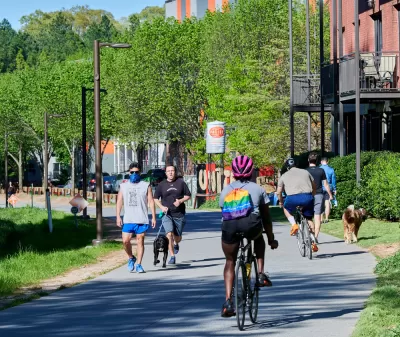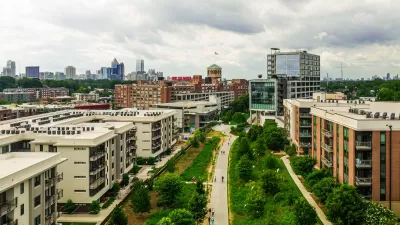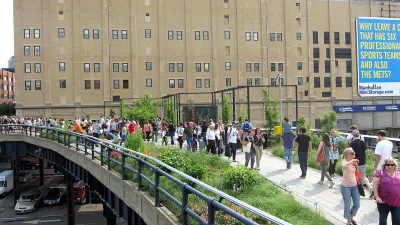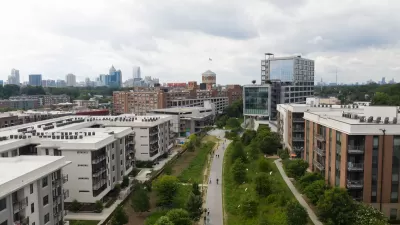For one author, the key is focusing on affordable housing from the start.

Writing in The Conversation, author of Red Hot City: Housing, Race, and Exclusion in Twenty-First Century Atlanta Dan Immergluck describes how “planning and policy decisions [in Atlanta] have promoted a heavily racialized version of gentrification that has excluded lower-income, predominantly Black residents from sharing in the city’s growth.”
In particular, Immergluck faults the Atlanta BeltLine multiuse trail, a repurposed former railway corridor that has in some ways revitalized the surrounding area at the expense of low-income households who were pushed out. Immergluck calls this “green gentrification” that occurs when new green spaces and park facilities lead to higher housing costs and displacement. “If cities fail to prepare for these effects, gentrification and displacement can transform lower-income neighborhoods into areas of concentrated affluence rather than thriving, diverse communities.”
The BeltLine, first proposed in the early 2000s, became a transformative project for Atlanta. In 2007, Immergluck found that property values near the BeltLine were indeed going up faster than in other areas. “This meant that property taxes rose for many lower-income homeowners, and landlords of rental properties were likely to raise rents in response.”
As the article explains, “Rather than focusing on securing land for affordable housing when values were low, Atlanta BeltLine, Inc. prioritized building trails and parks.” Pledges to support affordable housing went unfulfilled. “In 2017 the Atlanta Journal-Constitution ran a high-profile investigative series documenting that the BeltLine had produced just 600 units of affordable housing in 11 years – far off the pace required to meet its target of 5,600 by 2030.”
For Immergluck, the lesson for other cities and developments is clear. “In my view, the most important takeaway is the importance of front-loading affordable housing efforts in connection with major redevelopment projects.” He also suggests limiting property tax increases for low-income homeowners and giving tax breaks to landlords who keep rental housing units affordable.

Maui's Vacation Rental Debate Turns Ugly
Verbal attacks, misinformation campaigns and fistfights plague a high-stakes debate to convert thousands of vacation rentals into long-term housing.

Planetizen Federal Action Tracker
A weekly monitor of how Trump’s orders and actions are impacting planners and planning in America.

Chicago’s Ghost Rails
Just beneath the surface of the modern city lie the remnants of its expansive early 20th-century streetcar system.

Bend, Oregon Zoning Reforms Prioritize Small-Scale Housing
The city altered its zoning code to allow multi-family housing and eliminated parking mandates citywide.

Amtrak Cutting Jobs, Funding to High-Speed Rail
The agency plans to cut 10 percent of its workforce and has confirmed it will not fund new high-speed rail projects.

LA Denies Basic Services to Unhoused Residents
The city has repeatedly failed to respond to requests for trash pickup at encampment sites, and eliminated a program that provided mobile showers and toilets.
Urban Design for Planners 1: Software Tools
This six-course series explores essential urban design concepts using open source software and equips planners with the tools they need to participate fully in the urban design process.
Planning for Universal Design
Learn the tools for implementing Universal Design in planning regulations.
planning NEXT
Appalachian Highlands Housing Partners
Mpact (founded as Rail~Volution)
City of Camden Redevelopment Agency
City of Astoria
City of Portland
City of Laramie





























